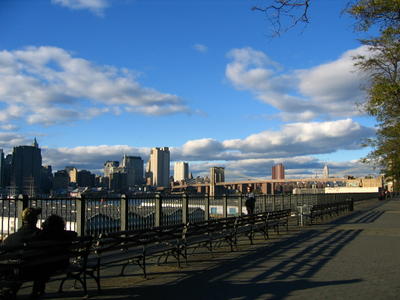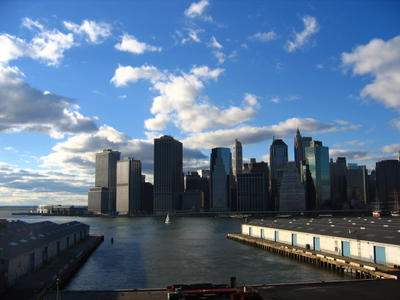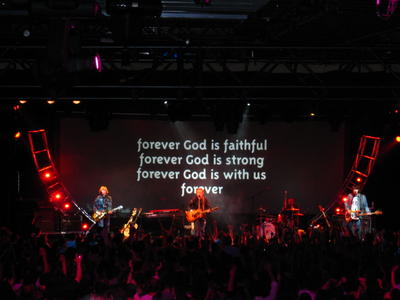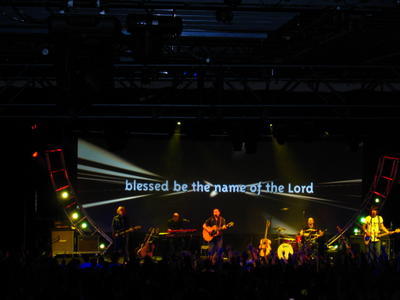The Veritas Forum at Columbia
Veritas Forums are university events that engage students and faculty in discussions about life's hardest questions and the relevance of Jesus Christ to all of life.
We invite people with differing worldviews, religions, and ideas to participate, ask questions, and join discussions in order to explore true life together, and we encourage participants to bring friends who are engaged in the exploration of life’s hardest questions.
From: www.veritas.org
“What is the biggest problem among today’s students?” Billy Graham recalled asking former Harvard president Derek Bok. The president answered, “Emptiness.” Started up by a group of Harvard students (hence Veritas, which is their school motto) in 1992, in response to the culture of fragmented scholars experiencing this “emptiness” within their own community, Veritas has taken root in more than over 50 campuses across America.
Exactly a week ago at Columbia, we had our annual Veritas forum –
“Exploring True Life. Responding to Suffering.”
This was my first Veritas Forum, ever, and I have just been so blessed by it. It was truly a privilege to grapple with some of life’s toughest questions in the company of very many distinguished speakers, alongside people of differing worldviews. I think that it is in engaging each other in respectful, meaningful conversation, that we all come to understand more of what is indeed, true life.
People Suffer – Who Cares?
A Secular Humanist and Christian Dialogue
The first session on Monday saw Professor Philip Kitcher, the Columbia University John Dewey Professor of Philosophy, in conversation with Dr. Vinoth Ramachandra, a theologian from Sri Lanka who has worked for decades among the destitute of his war-torn island.
Dr. Ramachandra started out by sharing some of his experiences with suffering – experiences that most of us are fortunate enough not to encounter daily, if at all. He spoke of comforting a friend who had lost her whole family to the tsunami, sitting by a four-year old child and watching him die of a disease that doesn’t exist in the West anymore, dealing with violence and tragedy on a daily basis, and watching his aged father slide further and further into dementia. I could feel my heart sink further with every illustration of the suffering that he has encountered. There is so much pain in this world, and yet for the most part, we are blissfully blind to it all.
Dr. Ramachandra was trained as a nuclear engineer in London, but he gave up a comfortable academic career to return to Sri Lanka. He spoke about how he has been passionate about the physical sciences ever since he was a boy. But, if science is the total truth, and all existence is a bizarre accident with no meaning, striving for justice is meaningless, because all people, good and evil, will suffer the same fate in the burning up of the sun, and in the end no one will be around to remember anything.
Nietzsche saw that all talk of human dignity and equality, upon which notions of justice are based, was a legacy of Judeo-Christian thought. We care, because God cares. Jesus’ crucifixion on the cross to cover our sins, tells us that God’s power is found in the mess that we’ve made of the world. God is a God who is not immune to suffering – God himself is to be numbered among the victims and not the oppressors. Human sin – the senseless attempt to live as if we were God and rejecting His rightful rule over our lives – is the prime evil. Dr. Ramachandra argued that the Bible does not even attempt to explain the origin of evil, for you can only explain the reasonable. Our turning against God, who loved us into existence and sustains us moment to moment, is absolutely irrational and absurd. It is because of our alienation from God that evil exists. Evil is irrational and unjustified. It is not be understood, but fought.
We live in the tension between the crucifixion and the resurrection. Jesus’ rising from the dead is the vindication and renewal of the created order, the redemption of all history, and God’s concrete promise that he will make all things new. We now live between the time where God suffered for us on earth and the eventual dawning of a new day. Remembering what God has done for us, and holding fast to His promises, we share in His indignation against injustice, and we turn from self-pity and apathy to action.
The problem of evil
Philip Kitcher responded by raising the age-old “problem of evil”. If God is good, why does He allow evil? Is it because He cannot prevent it? Then He is not all-powerful. Is it because He does not want to prevent it? Then He is not all good. This problem of theodicy has been discussed by countless philosophers far more distinguished than I throughout the centuries – there is not enough space (on this page and in my mind) to survey all that thought now, and I certainly do not profess to have the definitive answer.
However, I attended a debate at the Oxford Union sometime last year, between William Lane Craig and A. C. Grayling, about this very same topic. See Knowing Enough and The greatest thing you'll ever learn...
The gist of the response was that we are made in the image of God, so we have been given free will. The essence of sin is that we choose to reject God. We also considered the limits of human knowledge, especially with respect to finite minds trying to fathom the infinite.
I know that we do not know everything, but I think that we know enough. Now, I also think that if we could fathom God completely, he would surely cease to be God and become more a product of our imagination.
Prof. Kitcher then posed the question – if God is omnipotent, why did could he not create free-willed beings who always chose correctly? But of course, omnipotence does not mean enabling logical contradictions, and choice is not choice if you only ever choose the same thing. Also, I’ve read more recently, and very intriguingly, that free choice is absolutely necessary for true, genuine love. God made us such that we can experience the deepest joy, which is to have a relationship with him – to love him and to be loved by him. If we had no real choice, then there would be no genuine relationship of love. God gave us the ability to choose to truly love him, in the very same way that he chose, at infinite cost to himself, to love us.
Prof. Kitcher described morality as a great, ongoing, work-in-progress of which religion is only a part – none of the thinkers have told us the final story yet. Morality comes from the deep altruism within us, and we can also find primitive similar impulses in animals. We should combine all the best of human thought so that we can refine all the altruistic impulses within us.
One of the participants raised a very interesting question in response to this claim during the Q & A section. He pointed out that if we see morality as an ongoing project, of which we are the ultimate creators and ultimate judges, how will we know if we have improved from where we were before? It seems to me that we do in fact need absolute standards in order to judge “progress”.
The problem of the intrinsic lovability
Prof. Kitcher also argued that we should love people because they are intrinsically lovable and worthy – it is appalling to think that you can only love someone because they bear the image of God. We should do the best we can without any myths and stories and intractable logical problems about a good God who allows evil.
The moderator pointed out that Christians didn't see a distinction between loving people for who they are and loving them because they are made in the image of God. A large part of who they are is that they are made in the image of God. Dr. Ramachandra asked Prof. Kitcher what were his grounds for claiming that people were intrinsically lovable. He pointed out that in the history of Western thought, concepts of intrinsic dignity and inherent worth were only introduced with the arrival of Christianity. Until early Christianity took hold in the Greco-Roman world, philosophers like Plato and Aristotle advocated hierarchical societies made up of individuals of different intrinsic worth (some people were born to be slaves, while others were born to rule). The equality and dignity of all is not a natural assumption everywhere – India still has remnants of the caste system which relegates a certain class of people as a “sub-species”.
Prof. Kitcher insisted on the notion of intrinsic lovability as a free-standing claim with no need for cumbersome metaphysics, but Dr. Ramachandra pointed out that you would still, in the end, have to go back to the “metaphysics” and the foundational claims because how else would you convince people with a totally different worldview to contribute scarce resources to “intrinsically unequal” beings? Prof. Kitcher said that we could convince them by showing them the potential these people have to contribute towards society if they were just given the chance. Dr. Ramachandra said that he now seemed to be valuing people instrumentally, based on what they can give to society. But what about the elderly or the disabled?
Prof. Kitcher insisted on things being intrinsically valuable even though they were transient – it’s not only some kind of transcendental source that can give value. He didn’t really elaborate this particular claim, and I personally think that it is quite problematic. Without an external, objective, transcendental source that confers value, we humans would be the ultimate judges of value, and that would simply allow for far too much cultural and moral relativity – you still would not be able to convince, for example, certain high-caste members in India that the untouchables are equally worthy of love and respect as they are. Everyone would simply appeal to their own judgment and culture and tradition, and who is to say that I am more “right” than you are?
Secular Liberalism as a Christian heresy
Dr. Ramachandra pointed out that it is easy for Prof. Kitcher to assume the universal acceptability of the notion of the intrinsic worth of every human being, because he is very much shaped by Western liberal thought, which, in and of itself, owes a lot of its beginnings to the teachings of Christianity. Dr. Ramachandra said that John Gray (Professor of European Thought at the LSE), who is no Christian, pointed out that secular humanism was nothing more than a Christian heresy. The Guardian reviewer of John Gray’s book, Heresies, writes: Gray evinces a Swiftian contempt for our latter-day lay priestlings, direct heirs of the 18th-century philosophes who proclaimed a new paganism but were in fact neo-Christians, "missionaries of a new gospel more fantastical than anything in the creed they imagined they had abandoned". All the Enlightenment did was to promote religion by other means, and its belief in progress was only the Christian message "emptied of transcendence and mystery". One of the heresies promulgated by Gray is that many of those who today continue to hold to religious faith are far more profound in their thinking, and certainly better educated, than most of their liberal-humanist opponents.
books.guardian.co.uk/review/story/0,12084,1295980,00.html
In my reading, I’ve also come across a fantastic quote by Clifford Orwin, discussing the thought of one of the leading secular liberals of our time: “Richard Rorty, the leading postmodern liberal theorist, …concedes that liberalism, once so jealous of its autonomy from Biblical faith, is in fact parasitic upon it. In his essay “Postmodern Bourgeois Liberalism,” he describes secular liberals like himself as “freeloading atheists.” They continue to rely on the Judeo-Christian legacy of concern with human dignity despite their rejection of the revealed truth that alone could support this concern… For Rorty, God is dead but secularized Christian morality continues.”
A slight diversion: A discussion of John Rawls and limits of Liberalism
The widely acclaimed John Rawls, who with the publication of his book A Theory of Justice was proclaimed the modern saviour of liberalism, seemed to have been sensitive to this problem of fundamental justification. In his book on human rights, The Law of Peoples, published almost 30 years after he wrote A Theory of Justice, Rawls envisions a global world order in which he interestingly does not advocate any sort of “global liberalism”. He makes allowances to tolerate what he calls “decent hierarchical societies” based on a shorter, more basic list of human rights (as opposed to the more comprehensive doctrine of liberal constitutional democracy that he proposes in A Theory of Justice). I think that it is extremely telling that Rawls saw the difficulty of promoting worldwide liberalism in the face of very divergent fundamental worldviews. (How would one convince any of the Islamic states of the superiority of the Western liberal model?) There were many who thought that towards the end of his life Rawls must have lost it – they saw The Law of Peoples as a cop-out – but I think that he was being very prescient and very realistic about the limitations of his theory.
Rawls’ theory of justice has been described as a reworking of Kant without the metaphysics. He wants to build a theory based on an overlapping consensus about the good, without having to delve too far into cumbersome metaphysics or anything of the sort. But of course built into the very foundations of his theory are countless liberal assumptions. His hypothetical mechanism of the ‘original position’, which is used to generate the basic principles of justice, is sometimes thought of as a “neutral” mechanism.
The rational calculators in the original position are behind a “veil of ignorance” – they do not know their gender, intelligence, position in society, religion etc, and they are asked to choose basic principles upon which society will operate. In deriving his basic principles of equal respect and of fair equality of opportunity from this hypothetical construct, Rawls seems to want to procede from socio-economic facts about the human condition to principles of justice. G. A. Cohen (Chichele Professor of Social and Political Theory, Oxford University), argues in a forthcoming book, that Rawls here confuses the principles of justice with optimal rules of social regulation. The fact that people are different in their abilities and beliefs and desires, makes it socially optimal that we construct a society that allows for different kinds of flourishing, but he argues that the fact of diversity in and of itself does not justify the principle of equality. After all, there have been many regimes and ideologies that recognised the fact of diversity but chose instead to brutally suppress it. The reason why any fact supports any principle is explained by a further, ultimate, fact-insensitive principle. (G. A. Cohen argues for this in his article, Facts and Principles). So the reason why the fact of diversity would lead us to support the principle of equality must be grounded upon a more ultimate principle like the value of human dignity and autonomy – two very “liberal” and very loaded claims.
I think Rawls realised that ultimate principles about the value of human autonomy were not accepted by all peoples – certain societies have a more “associationist” account of flourishing which sees people assigned specific roles in society (based on gender, class etc). The different, ultimate claims about the kind of value that human life has cannot be adjudicated by recourse to fact, and are extremely difficult, perhaps impossible, to reconcile. I am inclined to think that it is with these considerations in mind that Rawls wrote The Law of Peoples, in which he advocated tolerance of decent, though illiberal, societies.
Conclusion
I think that Prof. Kitcher speaks hastily when he denies the great influence that Christianity has had on the development of secular humanism, and when he argues that claims about the intrinsic lovability and worth of all human beings are “free-standing”, and in no need of further justification. It is perhaps the privilege of we who have grown up in liberal Western societies (I use this term somewhat loosely…) to simply accept the equal dignity of all as brute fact, but we must never deceive ourselves into thinking that the rest of the world naturally sees things the way that we do, or that they can be easily convinced of our views without any discussion of more fundamental claims about “cumbersome metaphysics”, or perhaps even, a discussion about God.
Publishing the Cries of the Oppressed
On the Front Lines of Human Rights Journalism
Nicholas Kristof on Darfur
Almost as if to prove Dr. Ramachandra right, the next night we had two very distinguished human rights journalists speak to us about the horrors of genocide. Nicholas Kristof, a columnist for The New York Times and winner of a Pulitzer Prize for his coverage of China’s Tiananmen Square democracy movement, spoke about the absolutely horrific genocide in Darfur, in western Sudan. Mr. Kristof was one of the first journalists to raise the alarm bell about the genocide in Darfur, and he is currently collecting pledges to send Bill O’Reilly, a major news network anchor, to Darfur. It’s partly a joke, but it’s also about naming and shaming the major broadcasters in an effort to get them to take their cameras and news crews into places like Darfur.
Mr. Kristof spoke of his own visits to the country, speaking to the displaced peoples and hearing countless stories of violent brutality and unspeakable horror. The government, in cahoots with the militia, are systematically wiping out the non-Arab African tribes. Rough estimates tell of 300,000 people having been systematically killed off, and 2 to 3 million people being displaced. Those who are alive all tell similar harrowing tales of assault, rape and slaughter. Mr. Kristof said that it was clear that the Sudanese government made the calculation that the death of a few hundred thousand in rural Sudan would not warrant the “trouble” of international intervention – so far they have been proved chillingly correct.
Check out: www.savedarfur.com
Mr. Kristof’s description of the situation in Sudan proves how heartbreakingly true it is, as Dr. Ramachandra argued, that beliefs about the intrinsic human worth and inviolability are not “natural” to all people.
Benedict Rogers on Burma and East Timor
Christian Solidarity Worldwide: www.csw.org.uk
Benedict Rogers, a freelance journalist and human rights activist spoke of the persecution of Burma’s ethnic minorities, which he says is basically genocide. He spoke of Burma as one of the most under-reported countries in the world, even though it is known to be one of the worst violaters of human rights. He said that all the people he spoke to there all say the same thing – ‘Thank God you’re here! We thought we had been forgotten’, and, ‘Please tell the world about us, please do not forget us.’
Mr. Rogers professed that he had become quite the Bob Dylan fan, citing his lyrics from Blowin' in the Wind:
How many ears must one man have
before he can hear people cry?
How many deaths will it take till he knows
that too many people have died?
How many years can some people exist
before they’re allowed to be free?
How many times can a man turn his head,
pretending he just doesn’t see?
He showed us photographs of people that had been used as human minesweepers, children who’d been kidnapped and forced to be child soldiers, villages burned to the ground, a child’s drawing of what he had seen – men being shot, women being raped, babies being crushed to death in rice pounders.
During a public speech a few years ago, a senior Burmese general spoke of the regime's desire to eliminate all opposition. "In 10 years, all Karen will be dead," he threatened. "If you want to see a Karen, you will have to go to a museum in Rangoon."
Another Burma Army commander, speaking after he had led an attack on a village—slaughtering people and urinating on the head of a villager—summed up the spirit of the SPDC: "I do not respect any religion. My religion is the trigger of my gun."
From Burma’s Almost Forgotten by Benedict Rogers
www.christianitytoday.com/ct/2004/003/7.52.html
That the West has come to embrace a system of belief that upholds the equality and dignity of all, without a necessary belief in God, seems to me to be a fortuitous culmination of historical forces, of which Christianity is a very important one (perhaps even the most important). Other cultures that have taken a different historical trajectory have not necessarily come to the same conclusions about human dignity and worth. It was Nietzsche who saw that the only logical consequence of the “death of God” and of the subsequent death of the morality that is rooted in the transcendental objectivity of God is that “This world is the will to power – and nothing besides!”
And this power can be used towards unspeakable ends.
Benedict Rogers also spoke movingly of the faith of those whom he had encountered – an unwavering faith that God is still with them, an unwavering faith that God will deliver them. Ending on a more positive note, Mr. Rogers spoke of East Timor. He was there the night the nation was formed. The account that he shared is very similar to what he writes here: It was midnight on May 20, 2002. The flag had just been raised, the national anthem sung, and the world’s newest nation was born. I turned to the man next to me, a priest who was the first from his country to be exiled. His name was Rev. Francisco Maria Fernandes, and he’d lived in exile for a quarter of a century. Had he ever believed he’d live to see the day when his country would be free? “Yes, I did,” he smiled. “All around the world, during our struggle, people asked me: ‘Why do you carry on? You are fighting a losing battle. The world will never help you; the oppressors will never let you go. Why don’t you just give up?’ But we had one thing those people did not know about. We trusted God. This was a victory of faith.”
www.crisismagazine.com/september2004/rogers.htm
Who Will Solve the Problem of Poverty? Bono, Bill Gates, You?
A Conversation with Jeffrey Sachs, Larry Reed and Vinoth Ramachandra
On the last night of the forum, we moved from theological and philosophical ideas, and issues about reporting atrocities and making them known, to discussing the widespread suffering caused by extreme poverty, and what we can do about it.
Larry Reed
www.opportunity.org
Larry Reed of Opportunity International Network, a global microfinancing coalition that provides affordable loans to the poor, spoke about how his faith had moved him to make a career out of poverty relief. He spoke about how we need to see the poor as part of the solution – not simply as the problem. He spoke touchingly about the people that Opportunity International worked with in the Third World, how all they needed was a little bit of help to get going. He also spoke about how Jesus has a radical concern for the poor, and how that when we serve others, especially the poor, we fulfill our purpose and we touch the very heart of God.
Jeffrey Sachs
www.earthinstitute.columbia.edu
Next up was the “star” of the evening – Professor Jeffrey Sachs, Director of The Earth Institute, Director of the UN Millenium Project, Professor of Health Policy and Management at Columbia University, and good friend of Bono and the Make Poverty History celebrity crew. He talked about extreme poverty in Africa. He said that Africa needs, firstly, better agricultural technology, which does not involve advanced machinery, but simply high yield seed varieties, fertilizers and better water management. Secondly, better disease control – 2 to 3 million a year die of malaria and other diseases that have virtually been eliminated in the West. Thirdly, increased connectivity in terms of everything from roads to internet access is also vital to economic progress.
He spoke forcefully about how we do in fact have the resources and the ability to fight poverty effectively, if only we can get our act together and do something about it. He showed us pictures from his numerous trips to Africa. And the one that will haunt me for a long time to come was a picture of toddlers lying in rows on colourful blankets in a spartan room. In close-up pictures of individual toddlers, you could see their eyes half-open and rolled back in a feverish stupor – these rows of children were all in malarial comatose. They were waiting to die.
A slight diversion: Reflections on the absurdity of sin
Professor Sachs looked like a man who was heavily burdened with all the cares of the world. There was a distinct tone of incredulity, of disbelief, in his voice when he spoke about how achievable and how affordable poverty relief is, and yet, time and time again, the rich just turn their backs on the poor. We turn our backs on each other. Children die of malaria, day after day after day, he said, and it just goes on and on and on. Henry Shue, when arguing for subsistence rights in his book Basic Rights, cites Coleridge saying that the poor will merely "die so slowly that none call it murder."
We can do something about it, but we don’t. These are our fellow human beings, but we just don’t care enough. What is wrong with us? It was at this point that I began to understand a little bit more of what Dr. Ramachandra meant by the absurdity of sin. In our self-absorption, in seeking to rule our own lives, our way, we turn away from God, and we turn our backs on each other. If we take selfishness as a brute fact of the human condition, then we are certainly not “irrational” in the means that we employ to achieve our selfish ends – no, we are perfectly rational in that. But what I think Dr. Ramachandra means here, is that if there is a God who created us and who loves us with an everlasting love, and if he created us all as his children through the redemptive work of Christ, then certainly, there is something intrinsically absurd about our sinful selfishness. It is utterly absurd for us to reject his love and to neglect, even actively harm, each other.
Vinoth Ramachandra
Dr. Ramachandra spoke last. He said he fully endorsed what Prof. Sachs had said. He started by talking about how we could understand the rights of the poor. In the 13th century, before any global human rights movement, Saint Thomas Aquinas argued that in cases of need, all things are common property – need alone constitutes the poor man’s right. When the poor steal from the rich it is not theft, for God gave the world to us all. In fact, I am committing theft so long as I refuse to share with my needy neighbour, for the right to life trumps the right to personal property. The poor claiming their rightful entitlement is not simply benevolent generosity or enlightened self-interest on our parts, it is a matter of justice.
He talked about how most of the economic flows in the world are from poor to rich – debt repayment, agricultural tariffs, MNC profits, corrupt politicians squirreling money away to first world tax havens, the brain drain of educated professionals etc. He argued that justice for the poor must be seen in the wider context of shalom, the concept of full human flourishing described in the Bible. Shalom characterises a right relationship with God, with all of creation, with others and with ourselves. Poverty must be understood as a lack of resources overall, for grave economic inequality undermines social solidarity. We cannot separate discussions of poverty from social inequality and domination. A relational approach to poverty would focus, not just on the ends, but also on the means of economic improvement – there is a need to dismantle the relations of domination and exploitation that currently exist in the global economic system.
Perhaps, just perhaps, said Dr. Ramachandra, we need the poor far more than they need us.
We need them to show us our irrationality, our wastefulness, our emptiness, our greed, and our idolatry.
Maybe, just maybe, we are the ones that are in need of human development.



















